新实用标准大学英语第二册(第二版)-课文翻译
新编大学英语2第二册课文翻译
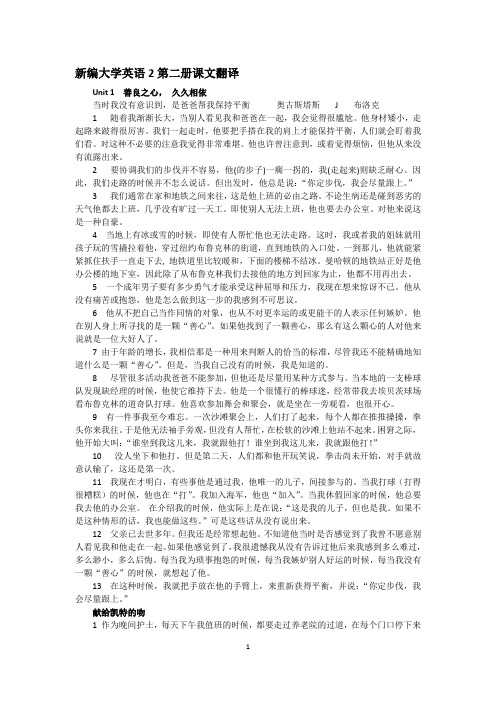
新编大学英语2第二册课文翻译Unit 1 善良之心,久久相依当时我没有意识到,是爸爸帮我保持平衡奥古斯塔斯 J 布洛克1 随着我渐渐长大,当别人看见我和爸爸在一起,我会觉得很尴尬。
他身材矮小,走起路来跛得很厉害。
我们一起走时,他要把手搭在我的肩上才能保持平衡,人们就会盯着我们看。
对这种不必要的注意我觉得非常难堪。
他也许曾注意到,或着觉得烦恼,但他从来没有流露出来。
2 要协调我们的步伐并不容易,他(的步子)一瘸一拐的,我(走起来)则缺乏耐心。
因此,我们走路的时候并不怎么说话。
但出发时,他总是说:“你定步伐,我会尽量跟上。
”3 我们通常在家和地铁之间来往,这是他上班的必由之路。
不论生病还是碰到恶劣的天气他都去上班,几乎没有旷过一天工。
即使别人无法上班,他也要去办公室。
对他来说这是一种自豪。
4 当地上有冰或雪的时候,即使有人帮忙他也无法走路。
这时,我或者我的姐妹就用孩子玩的雪撬拉着他,穿过纽约布鲁克林的街道,直到地铁的入口处。
一到那儿,他就能紧紧抓住扶手一直走下去, 地铁道里比较暖和,下面的楼梯不结冰。
曼哈顿的地铁站正好是他办公楼的地下室,因此除了从布鲁克林我们去接他的地方到回家为止,他都不用再出去。
5 一个成年男子要有多少勇气才能承受这种屈辱和压力,我现在想来惊讶不已。
他从没有痛苦或抱怨,他是怎么做到这一步的我感到不可思议。
6 他从不把自己当作同情的对象,也从不对更幸运的或更能干的人表示任何嫉妒。
他在别人身上所寻找的是一颗“善心”。
如果他找到了一颗善心,那么有这么颗心的人对他来说就是一位大好人了。
7 由于年龄的增长,我相信那是一种用来判断人的恰当的标准,尽管我还不能精确地知道什么是一颗“善心”。
但是,当我自己没有的时候,我是知道的。
8 尽管很多活动我爸爸不能参加,但他还是尽量用某种方式参与。
当本地的一支棒球队发现缺经理的时候,他使它维持下去。
他是一个很懂行的棒球迷,经常带我去埃贝茨球场看布鲁克林的道奇队打球。
大学英语精读 第二册第一、二课 课文翻译
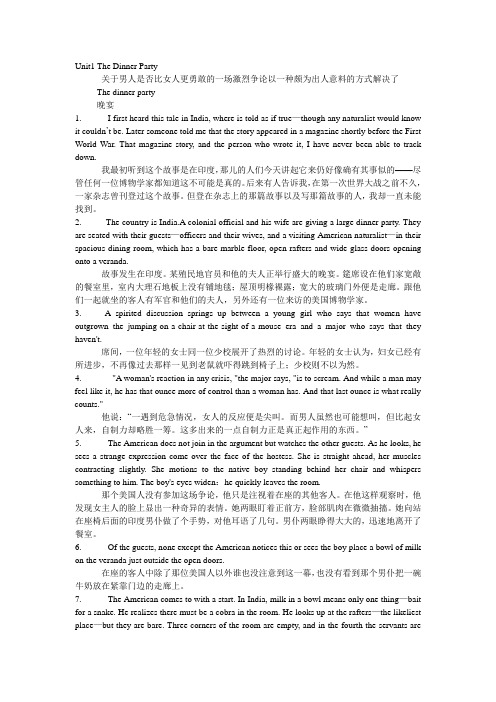
Unit1 The Dinner Party关于男人是否比女人更勇敢的一场激烈争论以一种颇为出人意料的方式解决了The dinner party晚宴1. I first heard this tale in India, where is told as if true—though any naturalist would know it couldn’t be. Later someone told me that the story appeared in a magazine shortly before the First World War. That magazine story, and the person who wrote it, I have never been able to track down.我最初听到这个故事是在印度,那儿的人们今天讲起它来仍好像确有其事似的——尽管任何一位博物学家都知道这不可能是真的。
后来有人告诉我,在第一次世界大战之前不久,一家杂志曾刊登过这个故事。
但登在杂志上的那篇故事以及写那篇故事的人,我却一直未能找到。
2.The country is India.A colonial official and his wife are giving a large dinner party. They are seated with their guests—officers and their wives, and a visiting American naturalist—in their spacious dining room, which has a bare marble floor, open rafters and wide glass doors opening onto a veranda.故事发生在印度。
某殖民地官员和他的夫人正举行盛大的晚宴。
Unit-6-Food新编大学英语第二版第二册课文翻译
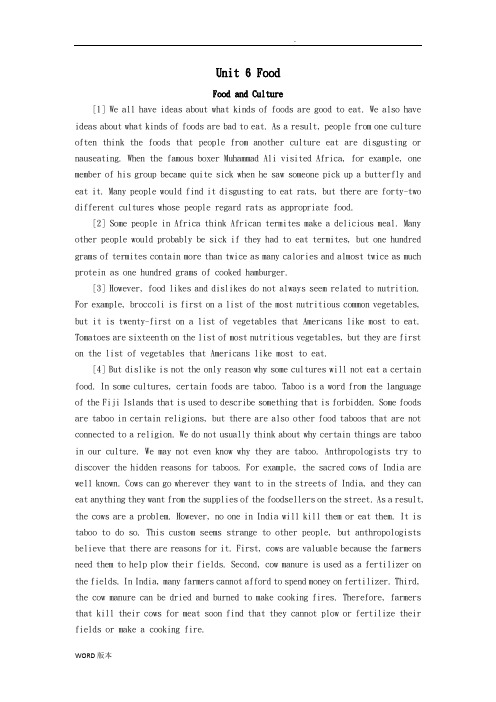
Unit 6 FoodFood and Culture[1] We all have ideas about what kinds of foods are good to eat. We also have ideas about what kinds of foods are bad to eat. As a result, people from one culture often think the foods that people from another culture eat are disgusting or nauseating. When the famous boxer Muhammad Ali visited Africa, for example, one member of his group became quite sick when he saw someone pick up a butterfly and eat it. Many people would find it disgusting to eat rats, but there are forty-two different cultures whose people regard rats as appropriate food.[2] Some people in Africa think African termites make a delicious meal. Many other people would probably be sick if they had to eat termites, but one hundred grams of termites contain more than twice as many calories and almost twice as much protein as one hundred grams of cooked hamburger.[3] However, food likes and dislikes do not always seem related to nutrition. For example, broccoli is first on a list of the most nutritious common vegetables, but it is twenty-first on a list of vegetables that Americans like most to eat. Tomatoes are sixteenth on the list of most nutritious vegetables, but they are first on the list of vegetables that Americans like most to eat.[4] But dislike is not the only reason why some cultures will not eat a certain food. In some cultures, certain foods are taboo. Taboo is a word from the language of the Fiji Islands that is used to describe something that is forbidden. Some foods are taboo in certain religions, but there are also other food taboos that are not connected to a religion. We do not usually think about why certain things are taboo in our culture. We may not even know why they are taboo. Anthropologists try to discover the hidden reasons for taboos. For example, the sacred cows of India are well known. Cows can go wherever they want to in the streets of India, and they can eat anything they want from the supplies of the foodsellers on the street. As a result, the cows are a problem. However, no one in India will kill them or eat them. It is taboo to do so. This custom seems strange to other people, but anthropologists believe that there are reasons for it. First, cows are valuable because the farmers need them to help plow their fields. Second, cow manure is used as a fertilizer on the fields. In India, many farmers cannot afford to spend money on fertilizer. Third, the cow manure can be dried and burned to make cooking fires. Therefore, farmers that kill their cows for meat soon find that they cannot plow or fertilize their fields or make a cooking fire.[5] Another example is that Americans do not eat dogs, although people from some other cultures regard them as good food. In the United States, dogs are very important to people as pets. They are usually regarded as part of the family, almost like a child in some cases. In addition, dogs have value as protection against criminals. Thieves will not usually enter a house where there is a dog because the dog will bark and possibly attack a stranger who is trying to get into a house. Apparently, the dog's place in society as a companion and as protection against criminals makes the dog taboo as food.[6] The taboo against eating pork occurs in more than one culture. There is some evidence that some ancient Egyptians did not eat pork. The ancient Israelites also regarded pork as taboo. One explanation for the pig-eating taboo is that pork that is not cooked sufficiently may spread a disease called trichinosis. However, most people no longer think that this is a good explanation for the pork taboo. Another explanation is that the Israelites were nomads—they were always moving from place to place. People have to stay in one place to raise pigs. The Israelites did not want to stay in one place because they did not want to change their culture. As a result, they did not eat pigs.[7] Anthropologists believe that most food likes and dislikes are a result of the ways of life of different people. Some people live in areas where there are both large animals and many insects. It is difficult for these people to kill large animals, and it requires a lot of energy. It is easier for them to use insects for food because it is not difficult to catch insects and it does not require a lot of energy. Nomadic people who move around will not want to keep pigs for food. People will not eat pets such as dogs. Americans eat a lot of beef because there is plenty of land for raising cattle and their meat can be shipped cheaply for long distances by railroads.饮食与文化1 对于什么样的食物好吃,我们都有自己的主见。
新视野大学英语第二版第二册课文翻译unit2-sectionb
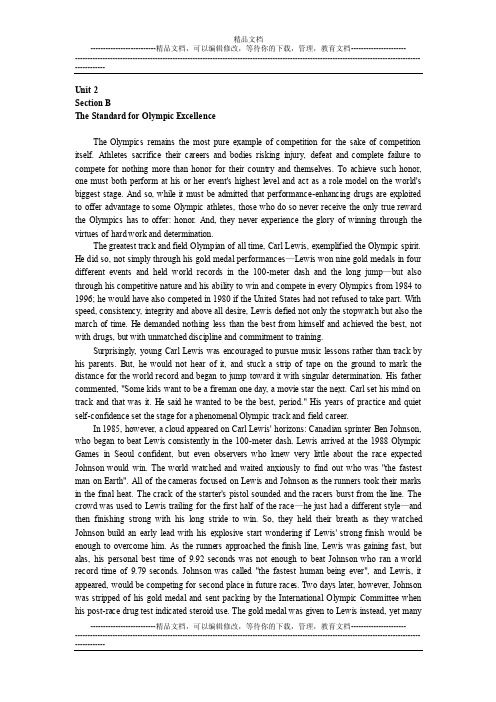
Unit 2Section BThe Standard for Olympic ExcellenceThe Olympics remains the most pure example of competition for the sake of competition itself. Athletes sacrifice their careers and bodies risking injury, defeat and complete failure to compete for nothing more than honor for their country and themselves. To achieve such honor, one must both perform at his or her event's highest level and act as a role model on the world's biggest stage. And so, while it must be admitted that performance-enhancing drugs are exploited to offer advantage to some Olympic athletes, those who do so never receive the only true reward the Olympics has to offer: honor. And, they never experience the glory of winning through the virtues of hard work and determination.The greatest track and field Olympian of all time, Carl Lewis, exemplified the Olympic spirit. He did so, not simply through his gold medal performances—Lewis won nine gold medals in four different events and held world records in the 100-meter dash and the long jump—but also through his competitive nature and his ability to win and compete in every Olympics from 1984 to 1996; he would have also competed in 1980 if the United States had not refused to take part. With speed, consistency, integrity and above all desire, Lewis defied not only the stopwatch but also the march of time. He demanded nothing less than the best from himself and achieved the best, not with drugs, but with unmatched discipline and commitment to training.Surprisingly, young Carl Lewis was encouraged to pursue music lessons rather than track by his parents. But, he would not hear of it, and stuck a strip of tape on the ground to mark the distance for the world record and began to jump toward it with singular determination. His father commented, "Some kids want to be a fireman one day, a movie star the next. Carl set his mind on track and that was it. He said he wanted to be the best, period." His years of practice and quiet self-confidence set the stage for a phenomenal Olympic track and field career.In 1985, however, a cloud appeared on Carl Lewis' horizons: Canadian sprinter Ben Johnson, who began to beat Lewis consistently in the 100-meter dash. Lewis arrived at the 1988 Olympic Games in Seoul confident, but even observers who knew very little about the race expected Johnson would win. The world watched and waited anxiously to find out who was "the fastest man on Earth". All of the cameras focused on Lewis and Johnson as the runners took their marks in the final heat. The crack of the starter's pistol sounded and the racers burst from the line. The crowd was used to Lewis trailing for the first half of the race—he just had a different style—and then finishing strong with his long stride to win. So, they held their breath as they watched Johnson build an early lead with his explosive start wondering if Lewis' strong finish would be enough to overcome him. As the runners approached the finish line, Lewis was gaining fast, but alas, his personal best time of 9.92 seconds was not enough to beat Johnson who ran a world record time of 9.79 seconds. Johnson was called "the fastest human being ever", and Lewis, it appeared, would be competing for second place in future races. Two days later, however, Johnson was stripped of his gold medal and sent packing by the International Olympic Committee when his post-race drug test indicated steroid use. The gold medal was given to Lewis instead, yet many --------------------------精品文档,可以编辑修改,等待你的下载,管理,教育文档----------------------------------------------------------------------------------------------------------------------------------------------------------------did not see his conquest as a real victory, and he became swept up in the apparent blanket condemnation of the sport. Worse, a former opponent charged Lewis with steroid use. Lewis firmly denied the charges and countered by proving before a judge that the magazine that had published the stories did so without foundation to their claims. He also participated in drug test after drug test to prove he was clean. An opponent of steroid use, Lewis was never linked to drug use by anything but rumor.It would take the formula of Lewis' further commitment to the sport and his love for competition to lift some of the suspicion from track events and stop the erosion of support that the Olympics began to suffer after Seoul. With his continued hard work and honest participation in sprinting and the long jump, he proved to the world that the Olympic spirit was not dead. And in 1992, Lewis competed in his third Olympics winning two more gold medals in the long jump and 4×100 meter relay with a reception from the public that was fit for a king.The amazing Carl Lewis had demonstrated that he was unlike any athlete who had ever lived, not by simply winning, but by winning honestly, loving to compete and working the hardest for the longest time. His love for the games truly set a new standard for Olympic excellence. (Words: 835)--------------------------精品文档,可以编辑修改,等待你的下载,管理,教育文档----------------------------------------------------------------------------------------------------------------------------------------------------------------。
新视野大学英语第二版第二册课文翻译Unit2-SectionA

Unit 2Sectio n ALearni ng the Olympic Standa rd for LoveNikola i Petrov i ch Anikin was not half as intimi datin g as I had imagin ed he wouldbe. No, this surely was not the ex-Soviet coachmy father had shippe d me out to meet.But Nikola i he was, Petrovi ch and all. He invite d me inside and sat down on the couch, patting the blanke t next to him to get me to sit next to him. I was so nervou s in his presen ce."Y ou are young,"he begani n his Russia n-styleEnglis h. "If you like to try for Olympi c Games, I guessyou will be able to do this. Nagano Olympi c s too soon for you, but for 2002 in Salt Lake City, you couldbe ready.""Y es, why not?" he replie d to the shocke d look on my face. I was a promisi ng amateu r ski er, but by no meansthe top skieri n the country. "Of course, there will be many hard traini ng sessions, and you will cry, but you will improv e."To be sure, there were countl ess traini ng sessio ns full of pain and more than a few tears, but in the five yearsthat followed I couldal ways count on beingencouragedby Nikola i's amusin g storie s and senseof humor."My friend s, they go in the movies, they go in the dance, they go out with girls," he woul dstart. "But I," he wouldcontin ue, loweri ng his voice, "I am practi c e, practi c e, practi c e in the stadium. And by the next year, I had cut 1-1/2 minute s off my time in the 15-kilome ter race!"My friend s askedme, 'Nikola i, how did you do it?' And I replie d, 'Y ou go in the movi es, you go in the dance, you go out with girls, but I am practi c e, practi c e, practi ce.'"Here the storyusuall y ended, but on one occasi on, which we laterl earne d was his 25th weddin g annive rsary, he stoodproudl y in a worn woolen sweate r and smiled and whispe red, "And I tell you, I am 26 yearsold before I ever kiss a girl! She was the womanI later marry."Romanti c and otherwi s e, Nikola i knew love. His consis tent good humor, quiet g ratit ude, percep tivit y, and sinceri ty set an Olympi c standa rd for love that I contin ue to reachfor, even though my skiing days are over.Still, he never babied me. One Februa ry day I had a massiv e headache and felt quitefatigued. I came upon him in a cleari ng, and after approxi mate l y 15 minute s of stridi ng into the cold breeze over the whitepowder to catchhim, I fussed, "Oh, Nikola i, I feel like I am goingto die.""When you are a hundre d yearsold, everyb ody dies," he said, indifferent to my pain. "But now," he contin ued firmly. "Now must be ski, ski, ski."And, on skis, I did what he said. On other matter s, though, I was rebell ious. Once, he packed 10 of us into a Finnis h bachel or's tiny home for a low-budget ski camp. We awokethe first morning to find Nikola i making breakfast and then made quick work with our spoons whilesittin g on makeshi ft chairs around a tiny card table. When we were finish ed, Nikola i stacke d the sti cky bowlsi n front of my sole female teamma te and me, asserti ng, "Now, girlsdo dishes!"I threwmy napkin on the floorand sworeat him, "Ask the damn boys! This is unfair." He neveraskedthi s of me again, nor did he take much notice of my outburst. He savedhis passio n for skiing.When coachi ng, he wouldsing out his instru ction s keepin g rhythm with our stride: "Y es, yes,one-two-three, one-two-three."A dear lady friend of my grandfather, after viewin g a copy of a videoof me traini ng with Nikola i, asked, "Does he also teachdance?"In traini ng, I worked wi thou t rest to correct mistak es that Nikola i pointe d out and I askedaftereach pass if it was better."Y es, it's OK. But the faster knee down, the better.""But is it fast enough?" I'd persis t.Finall y he wouldfrownand say, "Billio n timesyou make motion—then be perfect," reminding me in an I've-told-you-a-billio n-timestone, "Y ou must be patien t."Nikola i's patien ce and my hard work earned me a fourth-placenation al rankin g headin g into the pre-Olympi c season, but then I missed the cut for the 2002 Olympi c s.Last summer, I return ed to visit Nikola i. He made me tea... and did the dishes! We tal ked whilesi ttin g on his couch. Missin g the Olympi c Team the previo us year had made me pauseand reflect on what I had gained—not the least o f which was a quiet, indissolubl e bond with a shortman in a tropical shirt.Nikola i taught me to have the courag e, heart, and discip l ineto persis t, even if it takes a billion tries. He taught me to be thankful in advance for a century of life on earth, and to remind myself everyday that despit e the challe ngesat hand, "Now must be love, love, love."(Words:822)。
Unit7Culture新编大学英语第二版第二册课文翻译
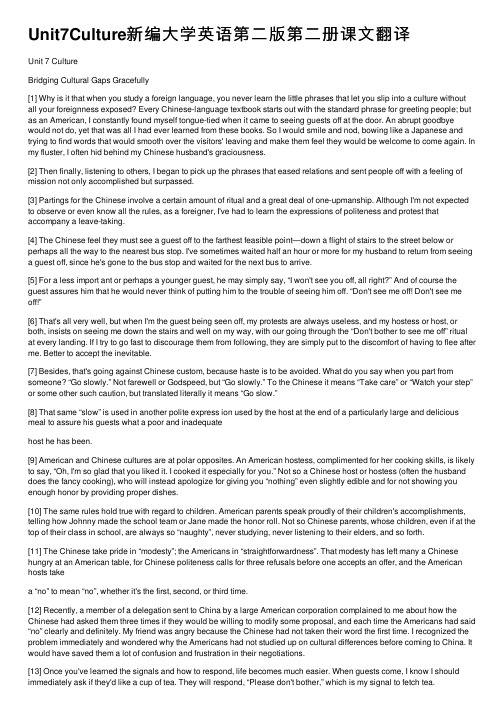
Unit7Culture新编⼤学英语第⼆版第⼆册课⽂翻译Unit 7 CultureBridging Cultural Gaps Gracefully[1] Why is it that when you study a foreign language, you never learn the little phrases that let you slip into a culture without all your foreignness exposed? Every Chinese-language textbook starts out with the standard phrase for greeting people; but as an American, I constantly found myself tongue-tied when it came to seeing guests off at the door. An abrupt goodbye would not do, yet that was all I had ever learned from these books. So I would smile and nod, bowing like a Japanese and trying to find words that would smooth over the visitors' leaving and make them feel they would be welcome to come again. In my fluster, I often hid behind my Chinese husband's graciousness.[2] Then finally, listening to others, I began to pick up the phrases that eased relations and sent people off with a feeling of mission not only accomplished but surpassed.[3] Partings for the Chinese involve a certain amount of ritual and a great deal of one-upmanship. Although I'm not expected to observe or even know all the rules, as a foreigner, I've had to learn the expressions of politeness and protest that accompany a leave-taking.[4] The Chinese feel they must see a guest off to the farthest feasible point—down a flight of stairs to the street below or perhaps all the way to the nearest bus stop. I've sometimes waited half an hour or more for my husband to return from seeinga guest off, since he's gone to the bus stop and waited for the next bus to arrive.[5] For a less import ant or perhaps a younger guest, he may simply say, “I won't see you off, all right?” And of course the guest assures him that he would never think of putting him to the trouble of seeing him off. “Don't see me off! Don't see meoff!”[6] That's all very well, but when I'm the guest being seen off, my protests are always useless, and my hostess or host, or both, insists on seeing me down the stairs and well on my way, with our going through the “Don't bother to see me off” ritual at every landing. If I try to go fast to discourage them from following, they are simply put to the discomfort of having to flee after me. Better to accept the inevitable.[7] Besides, that's going against Chinese custom, because haste is to be avoided. What do you say when you part from someone? “Go slowly.” Not farewell or Godspeed, but “Go slowly.” To the Chinese it means “Take care” or “Watch your step”or some other such caution, but translated literally it means “Go slow.”[8] That same “slow” is used in another polite express ion used by the host at the end of a particularly large and delicious meal to assure his guests what a poor and inadequatehost he has been.[9] American and Chinese cultures are at polar opposites. An American hostess, complimented for her cooking skills, is likely to say, “Oh, I'm so glad that you liked it. I cooked it especially for you.” Not so a Chinese host or hostess (often the husband does the fancy cooking), who will instead apologize for giving you “nothing” even slightly edible and for not showing you enough honor by providing proper dishes.[10] The same rules hold true with regard to children. American parents speak proudly of their children's accomplishments, telling how Johnny made the school team or Jane made the honor roll. Not so Chinese parents, whose children, even if at the top of their class in school, are always so “naughty”, never studying, never listening to their elders, and so forth.[11] The Chinese take pride in “modesty”; the Americans in “straightforwardness”. That modesty has left many a Chinese hungry at an American table, for Chinese politeness calls for three refusals before one accepts an offer, and the American hosts takea “no” to mean “no”, whether it's the first, second, or third time.[12] Recently, a member of a delegation sent to China by a large American corporation complained to me about how the Chinese had asked them three times if they would be willing to modify some proposal, and each time the Americans had said “no” clearly and definitely. My friend was angry because the Chinese had not taken their word the first time. I recognized the problem immediately and wondered why the Americans had not studied up on cultural differences before coming to China. It would have saved them a lot of confusion and frustration in their negotiations.[13] Once you've learned the signals and how to respond, life becomes much easier. When guests come, I know I should immediately ask if they'd like a cup of tea. They will respond, “Please don't bother,” which is my signal to fetch tea.从容得体德跨越⽂化沟壑1 在外语学习中,学会⼀些简单的词组就能让你不知不觉地进⼊另⼀种⽂化,⽽丝毫不暴露你作为⼀个外国⼈的⾝份,但你为什么总是学不会呢?每本汉语课本都,⼀律从问候语开始的。
新标准大学英语第二版综合教程2 Unit 2 B篇练习答案及课文翻译
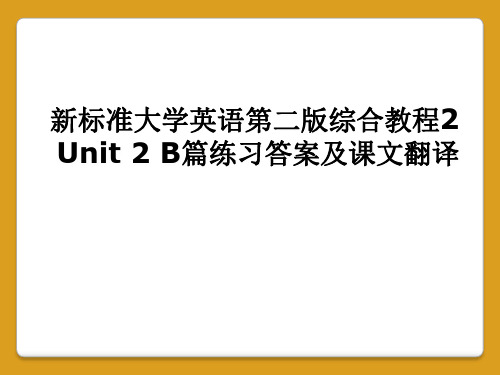
to a prestigious university e 3. trying to comfort someone who has had bad news. s 4. reacting physically when you see that someone is in pain
Text
How empathy unfolds
1 The moment Hope, just nine months old, saw another baby fall, tears welled up in her own eyes and she crawled off to be comforted by her mother, as though it were she who had been hurt. And 15-month-old Michael went to get his own teddy bear for his crying friend Paul; when Paul kept crying, Michael retrieved Paul’s security blanket for him. Both these small acts of sympathy and caring were observed by mothers trained to record such incidents of empathy in action. The results of the study suggest that the roots of empathy can be traced to infancy. Virtually from the day they are born infants are upset when they hear another infant crying – a response some see as the earliest precursor of empathy.
新实用标准大学英语(第二版)综合教程1问题详解解析汇报截图和课文翻译U1分解
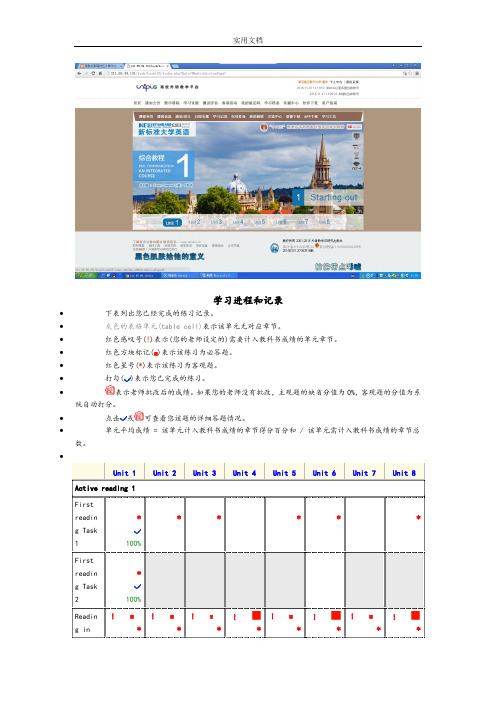
下表列出您已经完成的练习记录。
灰色的表格单元(table cell)表示该单元无对应章节。
红色感叹号(!)表示(您的老师设定的)需要计入教科书成绩的单元章节。
红色方块标记( )表示该练习为必答题。
红色星号(*)表示该练习为客观题。
打勾( )表示您已完成的练习。
表示老师批改后的成绩。如果您的老师没有批改,主观题的缺省分值为0%,客观题的分值为系统自动打分。
! *
100%
! *
89%
! *
! *
! *
! *
! *
! *
Reading in detail: Vocabulary exercises Task 3
! *
100%
! *
100%
! *
! *
! *
! *
! *
! *
Reading in detail: Vocabulary exercises Task 4
18那名女生名叫苏菲,和我一样,也是英语文学专业的学生。她看起来惊人地聪明。听完讲座后我们一起闲聊。她告诉我在间隔年里,她已经把这学期书单上的书全都读完了。她令人敬佩,我觉得自己太无知了,我甚至不配跟她呼吸同样的空气。
19妈妈打来电话,问我睡得好不好。
星期四
20今天有新生集会。苏菲和我跑去看我们能加入多少个俱乐部。我们俩都认为我们应该多结交朋友,所以我报名参加了交谊舞俱乐部、人工智能协会、手铃俱乐部和极限运动俱乐部。苏菲则报名参加了业余剧社和莫扎特合唱团。我不知道苏菲和我还能不能继续做好朋友。
23今晚学生会举办“社团之夜”晚会,可我已经没有干净衣服穿了。我可不清楚把脏衣服扔进脏衣篮之后到它们干干净净、熨烫笔挺并叠好放进衣柜之前都发生了什么。也许妈妈快来电话了。
新标准大学英语第二册(第二版)全册课文
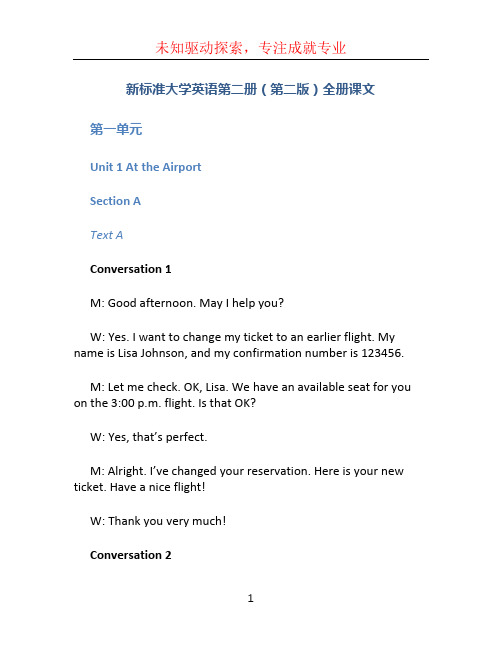
新标准大学英语第二册(第二版)全册课文第一单元Unit 1 At the AirportSection AText AConversation 1M: Good afternoon. May I help you?W: Yes. I want to change my ticket to an earlier flight. My name is Lisa Johnson, and my confirmation number is 123456.M: Let me check. OK, Lisa. We have an available seat for you on the 3:00 p.m. flight. Is that OK?W: Yes, that’s perfect.M: Alright. I’ve changed your reservation. Here is your new ticket. Have a nice flight!W: Thank you very much!Conversation 2M: Hi, I’ve got some extra t ime before my flight. Do you know if there’s a restaurant around here?W: Yes, there are a few restaurants in the airport. If you go to the second floor, there’s a food court with different options.M: Thanks! I’ll go check it out.W: You’re welcome!Text BConversation 1M: Excuse me. Is this seat taken?W: Oh, no. You can take it.M: Thanks. Can I use the pillow and the blanket?W: Sure. Help yourself. They are free for use during the flight.M: Great!Conversation 2M: Excuse me, is there a restroom on the plane?W: Yes, there’s one at the back of the airplane.M: How long does the flight take?W: The flight takes about four hours, including a stopover in Chicago.M: Oh, I see. Thank you!Section BText AListening 1Narrator: Welcome to the English Language Study Program at our university. Today, we are going to talk about the courses you will take during your studies. As you know, we have different levels—elementary, intermediate, and advanced. The courses you take will depend on your language ability. If you are an elementary student, you will begin with basic grammar and vocabulary classes. In these classes, you will learn simple sentence structures and common words. You will also practice listening and speaking skills through conversations and group activities. In the intermediate level, you will build on what you learned in the elementary level. You will study more complex grammar and expand your vocabulary. You will also read short stories and articles to improve your reading comprehension. In the advanced level, you will focus on advanced grammar, such as conditional sentences and reported speech. You will also read authentic materials like newspapers and academic texts. You will have the opportunity to express your opinions and ideas through debates and presentations. We hope you enjoy your studies here!Listening 2Narrator: Welcome to our university’s library. Here you will find a wide range of resources for your studies. Let me introduce you to the different sections in our library. We have a fiction section where you can find popular novels and literature. If you are interested in history or biographies, you can check out our non-fiction section. We also have a reference section with dictionaries, encyclopedias, and other reference books. In addition, we have a periodical section where you can find newspapers and magazines. If you are looking for computer resources or e-books, we have a digital section as well. Finally, we have a quiet study area where you can study in peace. Please be reminded to keep your noise level down and respect other students’ study time. Enjoy your time in the library!Text BListening 1Narrator: Welcome to the English Language Study Program at our university. Today, we are going to talk about the courses you will take during your studies. As you know, we have different levels—elementary, intermediate, and advanced. In the elementary level, you will start with learning basic greetings, introducing yourself, and asking simple questions. You will also learn about daily routines, family members, and describing people and places. In the intermediate level, you will continue to build on what you learned in the elementary level. You will study more complex grammar, such as past tenses and conditionals. You will also learn how to express your opinions and arguments in spoken and written English. In the advanced level, you will focus on academic skills, such as writing essays, giving presentations, and participating in discussions. You will also work on your listeningand reading skills through various authentic materials. We wish you success in your language studies!Listening 2Narrator: Welcome to our university library. Here you will find a wide range of resources to support your studies. Let me take you on a tour of our library. On the ground floor, we have the circulation desk where you can borrow and return books. We also have a self-checkout machine, which allows you to check out books by yourself. On the first floor, you will find the reference desk where our librarians are available to assist you with your research. This floor also houses our quiet study area, where you can concentrate on your studies without distractions. The second floor is home to the computer lab and the multimedia center, where you can access online databases and multimedia materials. Finally, on the third floor, we have group study rooms that can be booked in advance for group projects or study sessions. We hope you make good use of our library resources and have a productive academic experience!第二单元Unit 2 Taking a TaxiSection AText AConversation 1M: Excuse me, is this seat taken?W: No, it’s not. You can have it.M: Thank you.W: You’re welcome.Conversation 2M: Pardon me, do you know how much longer it will take to get to the airport?W: I think it should be about another 10 minutes. The traffic is quite heavy today.M: OK, thanks for letting me know.Text BConversation 1M: Excuse me, is this your bag?W: No, it’s not mine. Maybe it belongs to the passenger who sat here before me.M: Oh, I see. I’ll ask the flight attendant to take care of it.Conversation 2M: Do you mind if we lower the window a little? It’s too hot here.W: No, I don’t mind. Feel free to adjust the temperature to your comfort.Section BText AListening 1Narrator: Welcome to the English Language Study Program at our university. Today, we are going to talk about the courses you will take during your studies. In the elementary level, you will learn the basics of English, including greetings, introductions, and daily routines. You will also learn about different countries, cultures, and customs. In the intermediate level, you will build on what you learned in the elementary level. You will study more complex grammar topics, such as verb tenses, conditionals, and reported speech. You will also practice your reading and writing skills through various texts and assignments. In the advanced level, you will focus on academic English and critical thinking skills. You will learn how to write research papers, give presentations, and participate in discussions. You will also study advanced grammar structures and expand your vocabulary. We hope you enjoy your language studies!Listening 2Narrator: Welcome to our university library. We have a wide collection of books and resources to support your studies. On theground floor, you will find our fiction and non-fiction sections. The fiction section has a variety of novels, short stories, and poetry collections. The non-fiction section includes books on various subjects, such as history, science, and philosophy. On the first floor, we have our reference section, where you can find dictionaries, encyclopedias, and other reference materials. We also have a periodical section, which houses newspapers, magazines, and journals. The second floor is home to our digital section, where you can access e-books, online databases, and multimedia materials. Finally, we have a quiet study area on the third floor, where you can study in a peaceful environment. We hope you make the most of our library resources and have a successful academic journey!Text BListening 1Narrator: Welcome to the English Language Study Program at our university. Today, we are going to talk about the courses you will take during your studies. In the elementary level, you will learn the basics of English, such as greetings, introducing yourself, and asking and answering questions. You will also learn about different topics, including family, hobbies, and daily routines. In the intermediate level, you will continue to build on what you learned in the elementary level. You will study more complex grammar, such as different verb tenses and conditionals. You will also practice your listening and speaking skills through various activities and conversations. In the advanced level, you will focus on academic English and critical thinking skills. You will learn how to write essays, give presentations, and participate in discussions. You will also study advanced grammar and vocabulary to improveyour language proficiency. We wish you success in your language studies!Listening 2Narrator: Welcome to our university library. We have a wide range of resources to support your academic journey. On the ground floor, you will find our fiction section, where you can discover popular novels, classic literature, and poetry collections. The non-fiction section, also located on this floor, has books on various subjects, such as history, science, and philosophy. On the first floor, we have our reference section, which includes dictionaries, encyclopedias, and other reference materials. The periodical section is also on this floor, where you can find newspapers, magazines, and academic journals. In addition, we have a digital section on the second floor, where you can access e-books, online databases, and multimedia resources. Finally, we have a quiet study area on the third floor, where you can focus on your studies without distractions. We hope you find our library resources helpful and have a rewarding academic experience!(1208 words)。
新标准大学英语2课文翻译
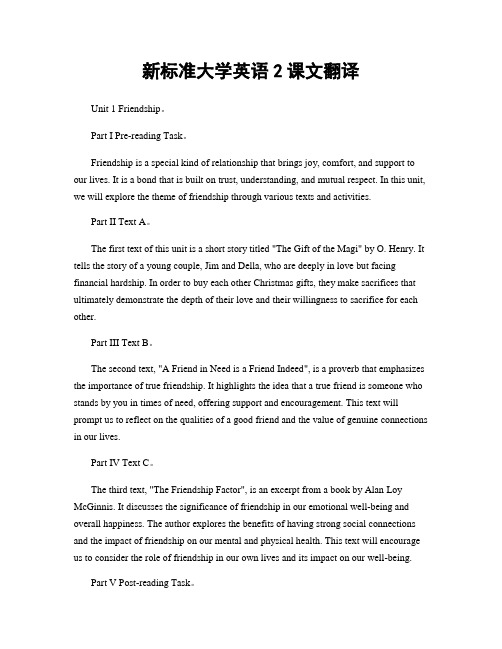
新标准大学英语2课文翻译Unit 1 Friendship。
Part I Pre-reading Task。
Friendship is a special kind of relationship that brings joy, comfort, and support to our lives. It is a bond that is built on trust, understanding, and mutual respect. In this unit, we will explore the theme of friendship through various texts and activities.Part II Text A。
The first text of this unit is a short story titled "The Gift of the Magi" by O. Henry. It tells the story of a young couple, Jim and Della, who are deeply in love but facing financial hardship. In order to buy each other Christmas gifts, they make sacrifices that ultimately demonstrate the depth of their love and their willingness to sacrifice for each other.Part III Text B。
The second text, "A Friend in Need is a Friend Indeed", is a proverb that emphasizes the importance of true friendship. It highlights the idea that a true friend is someone who stands by you in times of need, offering support and encouragement. This text will prompt us to reflect on the qualities of a good friend and the value of genuine connections in our lives.Part IV Text C。
新标准大学英语2
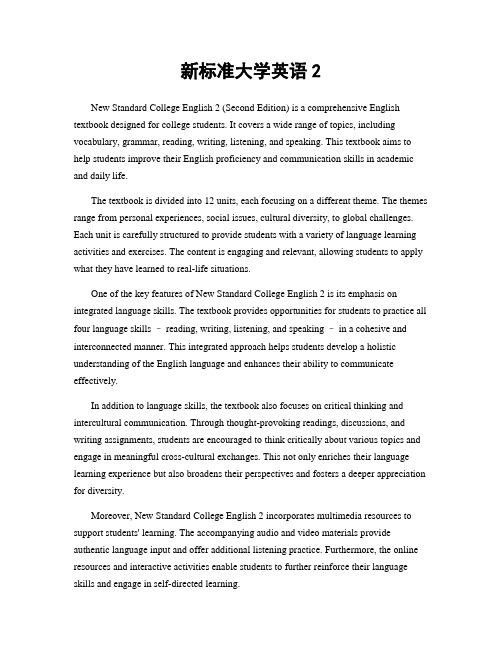
新标准大学英语2New Standard College English 2 (Second Edition) is a comprehensive English textbook designed for college students. It covers a wide range of topics, including vocabulary, grammar, reading, writing, listening, and speaking. This textbook aims to help students improve their English proficiency and communication skills in academic and daily life.The textbook is divided into 12 units, each focusing on a different theme. The themes range from personal experiences, social issues, cultural diversity, to global challenges. Each unit is carefully structured to provide students with a variety of language learning activities and exercises. The content is engaging and relevant, allowing students to apply what they have learned to real-life situations.One of the key features of New Standard College English 2 is its emphasis on integrated language skills. The textbook provides opportunities for students to practice all four language skills – reading, writing, listening, and speaking – in a cohesive and interconnected manner. This integrated approach helps students develop a holistic understanding of the English language and enhances their ability to communicate effectively.In addition to language skills, the textbook also focuses on critical thinking and intercultural communication. Through thought-provoking readings, discussions, and writing assignments, students are encouraged to think critically about various topics and engage in meaningful cross-cultural exchanges. This not only enriches their language learning experience but also broadens their perspectives and fosters a deeper appreciation for diversity.Moreover, New Standard College English 2 incorporates multimedia resources to support students' learning. The accompanying audio and video materials provide authentic language input and offer additional listening practice. Furthermore, the online resources and interactive activities enable students to further reinforce their language skills and engage in self-directed learning.Overall, New Standard College English 2 is a well-structured and comprehensive textbook that caters to the diverse needs of college students learning English. It provides a solid foundation for language acquisition and equips students with the necessary skills to thrive in an English-speaking environment. With its engaging content, integrated approach, and focus on critical thinking and intercultural communication, this textbook is an invaluable resource for both students and instructors.In conclusion, New Standard College English 2 is a valuable asset for college students seeking to enhance their English proficiency and communication skills. It offers a rich and diverse learning experience that goes beyond language acquisition and encompasses critical thinking and intercultural competence. As such, it is a highly recommended textbook for college English language learners.。
Unit-4-Psychology-in-Our-Daily-Life新编大学英语第二版第二册课文翻译
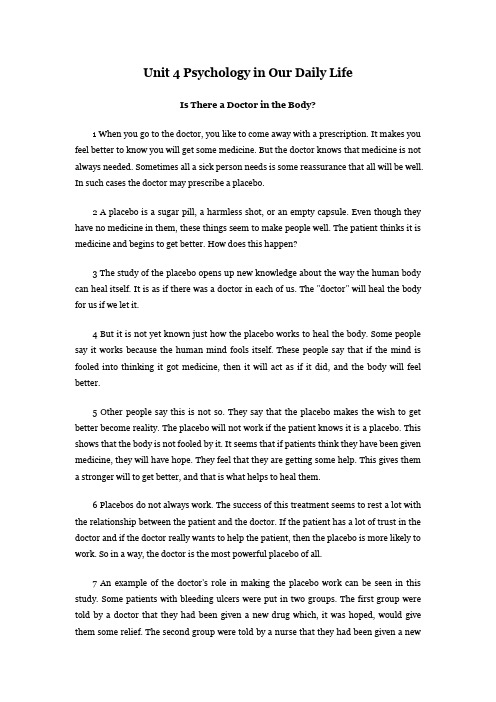
Unit 4 Psychology in Our Daily LifeIs There a Doctor in the Body?1 When you go to the doctor, you like to come away with a prescription. It makes you feel better to know you will get some medicine. But the doctor knows that medicine is not always needed. Sometimes all a sick person needs is some reassurance that all will be well. In such cases the doctor may prescribe a placebo.2 A placebo is a sugar pill, a harmless shot, or an empty capsule. Even though they have no medicine in them, these things seem to make people well. The patient thinks it is medicine and begins to get better. How does this happen?3 The study of the placebo opens up new knowledge about the way the human body can heal itself. It is as if there was a doctor in each of us. The "doctor" will heal the body for us if we let it.4 But it is not yet known just how the placebo works to heal the body. Some people say it works because the human mind fools itself. These people say that if the mind is fooled into thinking it got medicine, then it will act as if it did, and the body will feel better.5 Other people say this is not so. They say that the placebo makes the wish to get better become reality. The placebo will not work if the patient knows it is a placebo. This shows that the body is not fooled by it. It seems that if patients think they have been given medicine, they will have hope. They feel that they are getting some help. This gives them a stronger will to get better, and that is what helps to heal them.6 Placebos do not always work. The success of this treatment seems to rest a lot with the relationship between the patient and the doctor. If the patient has a lot of trust in the doctor and if the doctor really wants to help the patient, then the placebo is more likely to work. So in a way, the doctor is the most powerful placebo of all.7 An example of the doctor's role in making the placebo work can be seen in this study. Some patients with bleeding ulcers were put in two groups. The first group were told by a doctor that they had been given a new drug which, it was hoped, would give them some relief. The second group were told by a nurse that they had been given a newdrug but that not much was known about how it would work. As a result, 70 percent of the people in the first group got much better. Only 25 percent of the people in the second group got better. And both groups had in fact been given the same thing a placebo.8 The placebo has been found to work with a lot of different cases. It helps such things as seasickness, coughs, colds, and even pain after an operation. And there was an experiment done to see if a placebo could help old people stay healthy and live longer.9 The test was done in Romania with 150 people over the age of 60. They were put in three groups with 50 people in each group. The first group were given nothing at all. The second group were given a placebo. The third group were given a real drug and told that it would help with the problems of old age. (In fact, it was not a drug for old age at all.) The three groups were studied for many years. The first group showed no changes from the way old people in that village had always been. The second group (with the placebo) had much better health and a lower death rate. The third group (with the real drug) showed much the same results as the group that took the placebo.10 A placebo can also have bad effects. If patients expect a bad reaction to medicine, then they will also show a bad reaction to the placebo. This would seem to show that a lot of how you react to medicine is in your mind rather than in your body. Some doctors still think that if the placebo can have bad effects it should never be used. They think there is still not enough known about it.11 And yet, the use of the placebo has been well known for hundreds of years in other countries. Tribal doctors in some African countries have known for a long time that patients will get better if they think they are going to. Many of the "treatments" they use do not seem able to make a sick person better, and yet such treatments work.12 The strange power of the placebo does seem to suggest that the human mind is stronger than we think it is. There are people who say you can heal your body by using your mind. And the interesting thing is that even people who swear this is not possible have been healed by a placebo.人体内有医生吗?1 当你去看病时,你总希望走时能拿到一张药方。
新标准大学英语综合教程2课文翻译U6R1
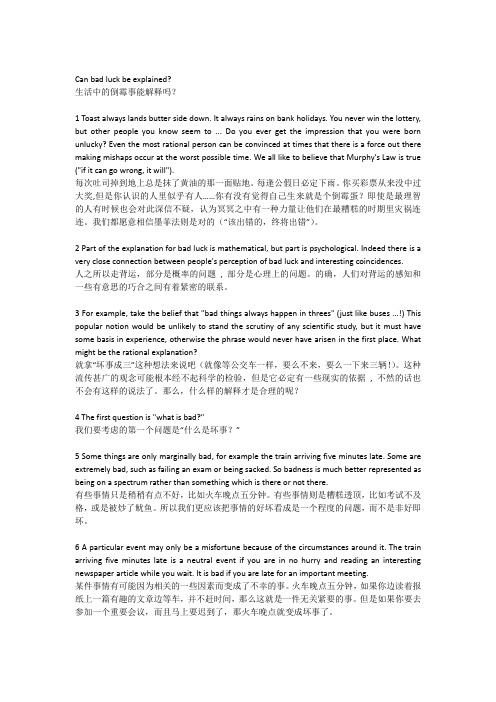
Can bad luck be explained?生活中的倒霉事能解释吗?1 Toast always lands butter side down. It always rains on bank holidays. You never win the lottery, but other people you know seem to ... Do you ever get the impression that you were born unlucky? Even the most rational person can be convinced at times that there is a force out there making mishaps occur at the worst possible time. We all like to believe that Murphy's Law is true ("if it can go wrong, it will").每次吐司掉到地上总是抹了黄油的那一面贴地。
每逢公假日必定下雨。
你买彩票从来没中过大奖,但是你认识的人里似乎有人……你有没有觉得自己生来就是个倒霉蛋?即使是最理智的人有时候也会对此深信不疑,认为冥冥之中有一种力量让他们在最糟糕的时期里灾祸连连。
我们都愿意相信墨菲法则是对的(“该出错的,终将出错”)。
2 Part of the explanation for bad luck is mathematical, but part is psychological. Indeed there is a very close connection between people's perception of bad luck and interesting coincidences.人之所以走背运,部分是概率的问题, 部分是心理上的问题。
(完整word版)Unit3BorntoWin新编大学英语第二版第二册课文翻译
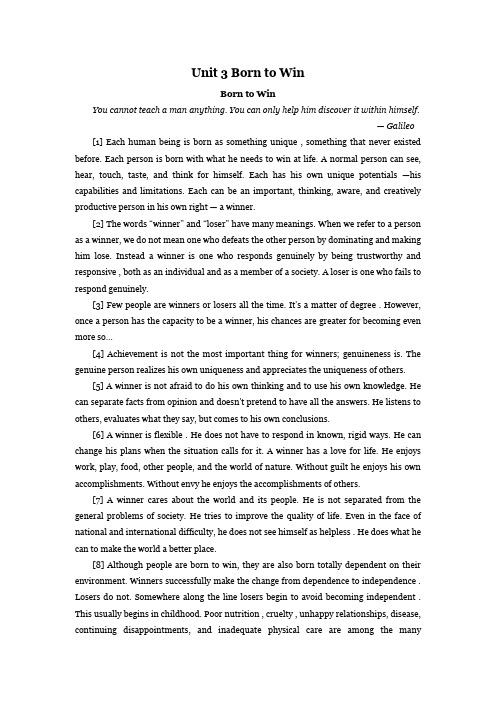
Unit 3 Born to WinBorn to WinYou cannot teach a man anything. You can only help him discover it within himself.— Galileo[1] Each human being is born as something unique , something that never existed before. Each person is born with what he needs to win at life. A normal person can see, hear, touch, taste, and think for himself. Each has his own unique potentials —his capabilities and limitations. Each can be an important, thinking, aware, and creatively productive person in his own right — a winner.[2] The words “winner” and “loser” have many meanings. When we refer to a person as a winner, we do not mean one who defeats the other person by dominating and making him lose. Instead a winner is one who responds genuinely by being trustworthy and responsive , both as an individual and as a member of a society. A loser is one who fails to respond genuinely.[3] Few people are winners or losers all the time. It's a matter of degree . However, once a person has the capacity to be a winner, his chances are greater for becoming even more so…[4] Achievement is not the most important thing for winners; genuineness is. The genuine person realizes his own uniqueness and appreciates the uniqueness of others.[5] A winner is not afraid to do his own thinking and to use his own knowledge. He can separate facts from opinion and doesn't pretend to have all the answers. He listens to others, evaluates what they say, but comes to his own conclusions.[6] A winner is flexible . He does not have to respond in known, rigid ways. He can change his plans when the situation calls for it. A winner has a love for life. He enjoys work, play, food, other people, and the world of nature. Without guilt he enjoys his own accomplishments. Without envy he enjoys the accomplishments of others.[7] A winner cares about the world and its people. He is not separated from the general problems of society. He tries to improve the quality of life. Even in the face of national and international difficulty, he does not see himself as helpless . He does what he can to make the world a better place.[8] Although people are born to win, they are also born totally dependent on their environment. Winners successfully make the change from dependence to independence . Losers do not. Somewhere along the line losers begin to avoid becoming independent . This usually begins in childhood. Poor nutrition , cruelty , unhappy relationships, disease, continuing disappointments, and inadequate physical care are among the manyexperiences that contribute to making people losers.[9] A loser is held back by his low capacity to appropriately express himself through a full range of possible behavior. He may be unaware of other choices for his life if the path he chooses goes nowhere. He is afraid to try new things. He repeats not only his own mistakes and often repeats those of his family and culture.[10] A loser has difficulty giving and receiving love. He does not enter into close, honest, direct relationships with others. Instead, he tries to manipulate them into living up to his expectations and channels his energies into living up to their expectations.生而成功任何事都不可能由别人来教你,只能在别人的帮助下靠自己去发现。
新标准大学英语(第二版)综合教程2 Unit 6 B篇练习答案及课文翻译
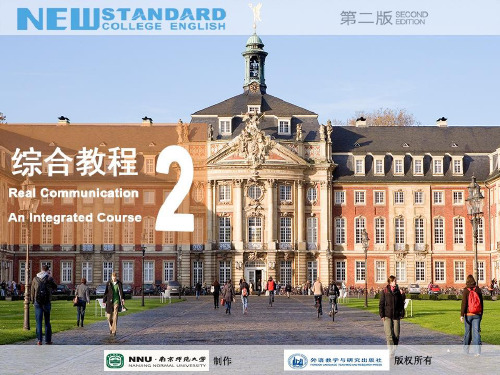
Text
2 So how do you get them to learn about science? Well, if you go into a campus bookstore youcan findout.Therearesongbooksfor biochemists,with chemical formulae set to music to make them easier to remember. Relativity is explained in a video game which is a simulation of a rocket journey through space: You can play tennis on board as the rocket speeds up or slows down. And there are cartoons to make even the most obscure scientific subjects accessible, and fun as well.
Text
6 The treatment of relativity in science fiction films is even more confusing. Take Star Trek: The Voyage Home (1987). As the spaceship revolves round the sun, it gathers so much speed that it moves backwards into history. But this is nonsense, not relativity. As Jones puts it, “Einstein said that nothing travels at more than the speed of light, not that the clocks will run the other way if you go fast enough.” Even Superman (1978) is baffled by the concept. It takes him a split second to fly round the earth anticlockwise to save Lois Lane, who has fallen victim to an earthquake. Jones: “Time is not like a car. It has no reverse gear.”
新大学英语第二册课文翻译[第一单元]
![新大学英语第二册课文翻译[第一单元]](https://img.taocdn.com/s3/m/45bc5a81524de518964b7dcc.png)
unit 1unit 1课文参考译文:写给女儿的信亲爱的女儿,我们驱车驶出哥伦比亚大学的时候,我就决定给你写封信,把我心里的想法全都告诉你。
首先,我想对你说,我们为你感到骄傲。
进入哥伦比亚大学真正证明了你在学业、艺术和社交方面的能力。
无论是你高中微积分得第一名,完成漂亮的时装设计,成功卖出自己绘制的跑鞋,还是在“模拟联合国”中成为最优秀的演讲人之一,你已经成为一个多才多艺、颇有成就的女孩。
你应该像我们一样为自己感到骄傲。
我会永远记得第一次将你抱在怀里的那一刻。
我内心升起一股颤栗的感觉,我想那必定是将我们一生都连在一起的“父女情结”。
我记得唱着催眠曲轻轻摇你入睡。
你从出生就一直是个特别乖巧的孩子,总是非常文静、体贴专注,又懂礼貌。
记得三岁的你每个周末都跟着我们去买建房的材料,乐呵呵地在车上吃着汉堡,与巴尼唱着歌,唱累了就睡觉,忍受着长时间的乏味却一点儿不抱怨。
你上周日中文学习班,尽管一点也不觉得有趣,却依然很努力地学。
我真不敢相信,有你这样的女儿,做父母的是多么的幸运!你也是个好姐姐。
虽然你们姐妹以前也吵过架,但是最近几年,你们真的成了好朋友。
妹妹很爱你,敬重你,并把你当成她的榜样。
你也看到了,我们开车离开哥大后,她会非常想你。
世界上最宝贵的就是家人,除了父母,妹妹就是你最可以信任的人了。
随着年龄的增长,你们姐妹之间的情谊不变,一直互相照应,彼此关心,这就是我们最希望见到的事情。
你在大学期间,一定要隔三岔五地就跟妹妹视频聊聊天,或写写电子邮件。
大学将是你人生最重要的时光。
你可能会常常问,“这些课程有什么用?”你在好奇爱问的同时,一定要记住:“教育就是在你忘记一切学到的东西之后所剩下的那个东西。
”在大学里,你将从聆听老师授课转向受到大师启迪,之后你会变成一个自我管理的学习者。
所以,即便你所学的不是生活中最重要的,请认真对待每一门功课,学习的能力将会让你受用终身的。
不要被教条所束缚,任何问题都没有唯一的简单答案。
全新版大学英语第二版阅读教程2 课文翻译
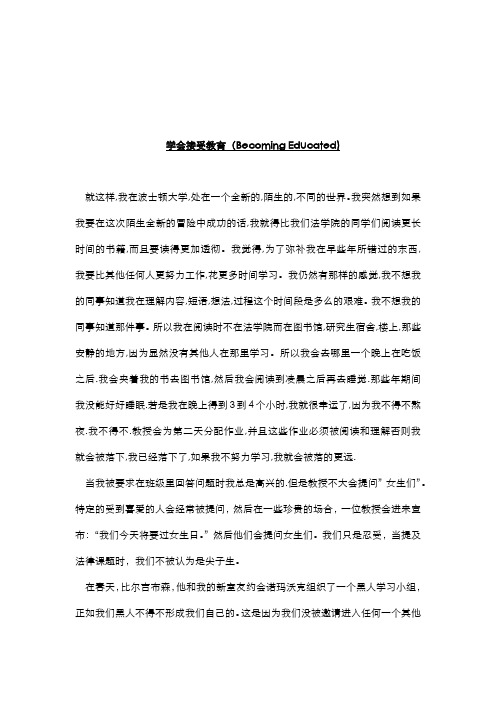
学会接受教育(Becoming Educated)就这样,我在波士顿大学,处在一个全新的,陌生的,不同的世界。
我突然想到如果我要在这次陌生全新的冒险中成功的话,我就得比我们法学院的同学们阅读更长时间的书籍,而且要读得更加透彻。
我觉得,为了弥补我在早些年所错过的东西,我要比其他任何人更努力工作,花更多时间学习。
我仍然有那样的感觉,我不想我的同事知道我在理解内容,短语,想法,过程这个时间段是多么的艰难。
我不想我的同事知道那件事。
所以我在阅读时不在法学院而在图书馆,研究生宿舍,楼上,那些安静的地方,因为显然没有其他人在那里学习。
所以我会去哪里一个晚上在吃饭之后.我会夹着我的书去图书馆,然后我会阅读到凌晨之后再去睡觉.那些年期间我没能好好睡眠.若是我在晚上得到3到4个小时,我就很幸运了,因为我不得不熬夜.我不得不.教授会为第二天分配作业,并且这些作业必须被阅读和理解否则我就会被落下,我已经落下了,如果我不努力学习,我就会被落的更远.当我被要求在班级里回答问题时我总是高兴的.但是教授不大会提问”女生们”。
特定的受到喜爱的人会经常被提问,然后在一些珍贵的场合,一位教授会进来宣布:“我们今天将要过女生日。
”然后他们会提问女生们。
我们只是忍受,当提及法律课题时,我们不被认为是尖子生。
在春天,比尔吉布森,他和我的新室友约会诺玛沃克组织了一个黑人学习小组,正如我们黑人不得不形成我们自己的。
这是因为我们没被邀请进入任何一个其他的学习小组。
我们组有6/7个成员,比尔和萨还有梅纳德杰克逊收集交流和听取我们怎么做。
我学到的一件事是,我们必须讲出来,问题,事实,案例还是过程。
我们不能仅仅阅读案例,独自在图书馆里学习,正如我以前一直那样,呆在教室里学不到全部。
但一旦我们在学习小组中讲出来了,接下来就变得更简单更容易理解了。
我不时会去罗利街2号看看路易斯是怎么做的。
她总是在看《红书》。
在那里我每次想要和她讨论某件事的时候,她会同时在阅读《红书》上的一则简短的故事。
新标准大学英语第二册(第二版)-课文翻译
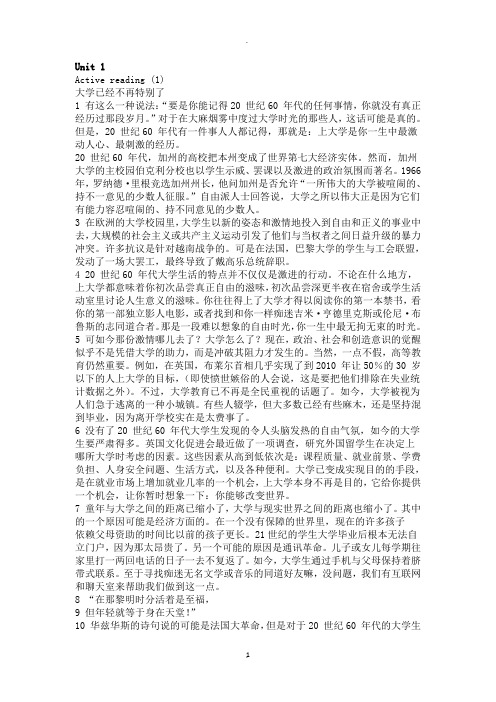
Unit 1Active reading (1)大学已经不再特别了1 有这么一种说法:“要是你能记得20 世纪60 年代的任何事情,你就没有真正经历过那段岁月。
”对于在大麻烟雾中度过大学时光的那些人,这话可能是真的。
但是,20 世纪60 年代有一件事人人都记得,那就是:上大学是你一生中最激动人心、最刺激的经历。
20 世纪60 年代,加州的高校把本州变成了世界第七大经济实体。
然而,加州大学的主校园伯克利分校也以学生示威、罢课以及激进的政治氛围而著名。
1966 年,罗纳德·里根竞选加州州长,他问加州是否允许“一所伟大的大学被喧闹的、持不一意见的少数人征服。
”自由派人士回答说,大学之所以伟大正是因为它们有能力容忍喧闹的、持不同意见的少数人。
3 在欧洲的大学校园里,大学生以新的姿态和激情地投入到自由和正义的事业中去,大规模的社会主义或共产主义运动引发了他们与当权者之间日益升级的暴力冲突。
许多抗议是针对越南战争的。
可是在法国,巴黎大学的学生与工会联盟,发动了一场大罢工,最终导致了戴高乐总统辞职。
4 20 世纪60 年代大学生活的特点并不仅仅是激进的行动。
不论在什么地方,上大学都意味着你初次品尝真正自由的滋味,初次品尝深更半夜在宿舍或学生活动室里讨论人生意义的滋味。
你往往得上了大学才得以阅读你的第一本禁书,看你的第一部独立影人电影,或者找到和你一样痴迷吉米·亨德里克斯或伦尼·布鲁斯的志同道合者。
那是一段难以想象的自由时光,你一生中最无拘无束的时光。
5 可如今那份激情哪儿去了?大学怎么了?现在,政治、社会和创造意识的觉醒似乎不是凭借大学的助力,而是冲破其阻力才发生的。
当然,一点不假,高等教育仍然重要。
例如,在英国,布莱尔首相几乎实现了到2010 年让50%的30 岁以下的人上大学的目标,(即使愤世嫉俗的人会说,这是要把他们排除在失业统计数据之外)。
不过,大学教育已不再是全民重视的话题了。
Unit 10 Emotions and Health新编大学英语第二版第二册课文翻译
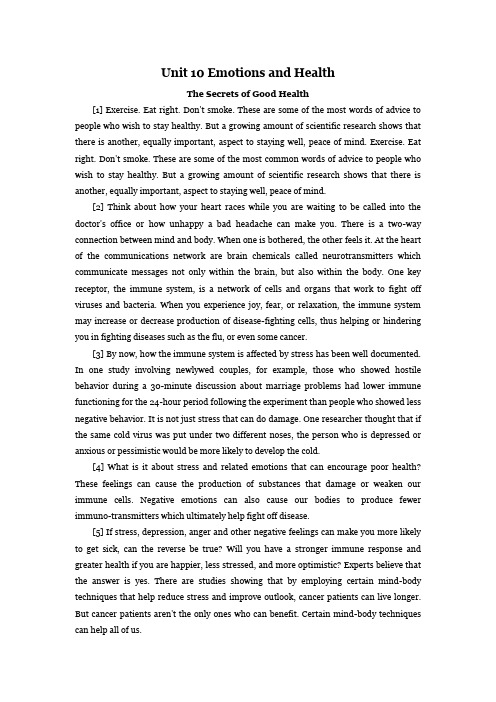
Unit 10 Emotions and HealthThe Secrets of Good Health[1] Exercise. Eat right. Don't smoke. These are some of the most words of advice to people who wish to stay healthy. But a growing amount of scientific research shows that there is another, equally important, aspect to staying well, peace of mind. Exercise. Eat right. Don't smoke. These are some of the most common words of advice to people who wish to stay healthy. But a growing amount of scientific research shows that there is another, equally important, aspect to staying well, peace of mind.[2] Think about how your heart races while you are waiting to be called into the doctor's office or how unhappy a bad headache can make you. There is a two-way connection between mind and body. When one is bothered, the other feels it. At the heart of the communications network are brain chemicals called neurotransmitters which communicate messages not only within the brain, but also within the body. One key receptor, the immune system, is a network of cells and organs that work to fight off viruses and bacteria. When you experience joy, fear, or relaxation, the immune system may increase or decrease production of disease-fighting cells, thus helping or hindering you in fighting diseases such as the flu, or even some cancer.[3] By now, how the immune system is affected by stress has been well documented. In one study involving newlywed couples, for example, those who showed hostile behavior during a 30-minute discussion about marriage problems had lower immune functioning for the 24-hour period following the experiment than people who showed less negative behavior. It is not just stress that can do damage. One researcher thought that if the same cold virus was put under two different noses, the person who is depressed or anxious or pessimistic would be more likely to develop the cold.[4] What is it about stress and related emotions that can encourage poor health? These feelings can cause the production of substances that damage or weaken our immune cells. Negative emotions can also cause our bodies to produce fewer immuno-transmitters which ultimately help fight off disease.[5] If stress, depression, anger and other negative feelings can make you more likely to get sick, can the reverse be true? Will you have a stronger immune response and greater health if you are happier, less stressed, and more optimistic? Experts believe that the answer is yes. There are studies showing that by employing certain mind-body techniques that help reduce stress and improve outlook, cancer patients can live longer. But cancer patients aren't the only ones who can benefit. Certain mind-body techniques can help all of us.[6] Research has found that when patients with chronic pain used relaxation therapies and other behavioral techniques to manage discomfort, they reduced their visits to the doctor by 36 percent. Relaxation produces better health through deep, rhythmic breathing, muscle loosening, and a slower heart rate. When some of the tension is taken out of the body, the strain is taken off the entire system. Relaxation decreases blood pressure, heart rate and respiration and increases one's sense of well-being. That is important because a body that is constantly tense will eventually give out.[7] There are dozens of mind-body techniques for you to choose from. The key is to find one you're comfortable with and then do it regularly. Simply writing about negative, unpleasant events may actually boost your immunity according to researchers. Scientists are not completely sure why it works but they know that when individuals write, it helps them organize events, which in turn gives them more understanding of the situation. When you can give a stressful experience meaning through writing, you don't think about it or worry about it as much. And when you reduce stress, you boost immune functioning. How much you write or how long you write depends upon how much stress you feel about the event. One doctor suggests that people write until they are tired of writing and then read over what they have written. This helps make more sense of it. Also, just talking about a stressful experience with a friend can have the same positive effect.[8] Study after study has shown that people with good support systems—caring, helpful family, friends and co-workers—have better health. Researchers think that the understanding we get from them reduces stress, which in turn helps the immune system. As one psychologist states, “When you have someone who loves you and cares about you to share your problems and feel ings with, you don’t feel you have to fight your problems, or the world, alone.” Another interesting study has shown that the more diverse your social network, the better, that people who have a number of different social relationships have a lower risk of getting colds than those with fewer.[9] There are other fast but effective mind-body relaxation techniques. One could be called “belly breathing”. Sit in a comfortable chair in a quiet room. Close your eyes. Breathe through your nose, fill your belly with air, then slowly release the breath through your mouth. Another technique could be called “mindfulness”. Take a slow walk and be aware of exactly what is happening to you at each moment—whether the wind is on your face, an insect is flying near you, or you hear birds singing. Even if you continue thinking about problems, you will become calmer and distance yourself from your problems. If you are at home, you might dance. Put on some fast music, close the door, and let yourself go. The dancing will energize you and that alone will make you feel better.[10] Whichever mind-body techniques work best for you, never rely on them and them alone to keep you mentally and physically well. Like exercise, good nutrition and proper medical care, methods such as relaxation therapies are only one part of the recipe for good health. Still, they are an important ingredient.健康的秘诀1 锻炼身体,饮食适当,不吸烟。
- 1、下载文档前请自行甄别文档内容的完整性,平台不提供额外的编辑、内容补充、找答案等附加服务。
- 2、"仅部分预览"的文档,不可在线预览部分如存在完整性等问题,可反馈申请退款(可完整预览的文档不适用该条件!)。
- 3、如文档侵犯您的权益,请联系客服反馈,我们会尽快为您处理(人工客服工作时间:9:00-18:30)。
Unit 1Active reading (1)大学已经不再特别了1 有这么一种说法:“要是你能记得20 世纪60 年代的任何事情,你就没有真正经历过那段岁月。
”对于在大麻烟雾中度过大学时光的那些人,这话可能是真的。
但是,20 世纪60 年代有一件事人人都记得,那就是:上大学是你一生中最激动人心、最刺激的经历。
20 世纪60 年代,加州的高校把本州变成了世界第七大经济实体。
然而,加州大学的主校园伯克利分校也以学生示威、罢课以及激进的政治氛围而著名。
1966 年,罗纳德·里根竞选加州州长,他问加州是否允许“一所伟大的大学被喧闹的、持不一意见的少数人征服。
”自由派人士回答说,大学之所以伟大正是因为它们有能力容忍喧闹的、持不同意见的少数人。
3 在欧洲的大学校园里,大学生以新的姿态和激情地投入到自由和正义的事业中去,大规模的社会主义或共产主义运动引发了他们与当权者之间日益升级的暴力冲突。
许多抗议是针对越南战争的。
可是在法国,巴黎大学的学生与工会联盟,发动了一场大罢工,最终导致了戴高乐总统辞职。
4 20 世纪60 年代大学生活的特点并不仅仅是激进的行动。
不论在什么地方,上大学都意味着你初次品尝真正自由的滋味,初次品尝深更半夜在宿舍或学生活动室里讨论人生意义的滋味。
你往往得上了大学才得以阅读你的第一本禁书,看你的第一部独立影人电影,或者找到和你一样痴迷吉米·亨德里克斯或伦尼·布鲁斯的志同道合者。
那是一段难以想象的自由时光,你一生中最无拘无束的时光。
5 可如今那份激情哪儿去了?大学怎么了?现在,政治、社会和创造意识的觉醒似乎不是凭借大学的助力,而是冲破其阻力才发生的。
当然,一点不假,高等教育仍然重要。
例如,在英国,布莱尔首相几乎实现了到2010 年让50%的30 岁以下的人上大学的目标,(即使愤世嫉俗的人会说,这是要把他们排除在失业统计数据之外)。
不过,大学教育已不再是全民重视的话题了。
如今,大学被视为人们急于逃离的一种小城镇。
有些人辍学,但大多数已经有些麻木,还是坚持混到毕业,因为离开学校实在是太费事了。
6 没有了20 世纪60 年代大学生发现的令人头脑发热的自由气氛,如今的大学生要严肃得多。
英国文化促进会最近做了一项调查,研究外国留学生在决定上哪所大学时考虑的因素。
这些因素从高到低依次是:课程质量、就业前景、学费负担、人身安全问题、生活方式,以及各种便利。
大学已变成实现目的的手段,是在就业市场上增加就业几率的一个机会,上大学本身不再是目的,它给你提供一个机会,让你暂时想象一下:你能够改变世界。
7 童年与大学之间的距离已缩小了,大学与现实世界之间的距离也缩小了。
其中的一个原因可能是经济方面的。
在一个没有保障的世界里,现在的许多孩子依赖父母资助的时间比以前的孩子更长。
21世纪的学生大学毕业后根本无法自立门户,因为那太昂贵了。
另一个可能的原因是通讯革命。
儿子或女儿每学期往家里打一两回电话的日子一去不复返了。
如今,大学生通过手机与父母保持着脐带式联系。
至于寻找痴迷无名文学或音乐的同道好友嘛,没问题,我们有互联网和聊天室来帮助我们做到这一点。
8 “在那黎明时分活着是至福,9 但年轻就等于身在天堂!”10 华兹华斯的诗句说的可能是法国大革命,但是对于20 世纪60 年代的大学生而言,这样的诗句同样真实生动。
可是为什么对于如今的大学生来说,它们怎么就不真实了呢?Active reading (2)后一切的一代1 弗兰克·托马斯是普林斯顿大学二年级学生,主修文学理论专业。
他希望当人权律师。
我从没指望通过上文学理论课来了解我这一代人的特征,或了解美国大学是如何在变化的。
这门课是让你在课堂上扮酷的——带着一丝熬夜太多的困劲儿,穿着一件T 恤衫,上面印着“去过那儿,干过那事儿,对,这就是那件T 恤衫”或诸如此类带有讥讽意味的俏皮话。
我是这样在课上消磨时间的:一边费力地听着性别理论和后殖民主义这样艰深的话题,一边用我的iPod 检索着好听的音乐。
可是当我开始学习后现代主义的时候,我突然咔嗒一声开了窍。
我提起精神,开始重新审视大学生活。
2 那么,什么是后现代主义呢?很难说,从定义角度来说,后现代主义几乎是无法定义的……就是有点儿否定和反对先前的一切的意思。
这就让人很难看清它究竟指的是什么。
这一术语是在1949 年被首次使用,可是迄今为止还没有人能断定,对于文化或社会的未来,后现代态度究竟意味着什么。
但对我来说,它令我感到好奇,因为后现代似乎说的正是我那些酷劲十足、困兮兮的和冷嘲热讽、穿T 恤衫的朋友们。
3 我们在那么多方面都是“后”的:后冷战,后工业时代、后生育高峰、后9.11。
我们这一代人来自所谓的短世纪(1914—1989),生于其末尾。
这个世纪充满了战争和革命,它改变了人类文明,推翻了强权政府,给我们留下了非同寻常的机会和特权,我们所得到的机会与特权比从前任何一代人都要多。
4 可是我们该干什么呢?我们该像历代大学生那样去造反、叛逆吗?我们要上街去一遍又一遍地高喊“不看到变化,我们决不离开”吗?不,我们做着相反的事情:我们去参战,根本不问为什么;我们放弃自己的公民自由权,我们每天在晚间新闻中观看破坏和死亡。
5 在大学里,我们在请愿书上签名,加入各种组织,把自己的名字添加到各种邮件通讯录中,戴为癌症研究义捐的标志腕带,观看电视转播的为非洲饥民募捐明星义演音乐会和为全球气候危机募捐明星义演音乐会――甚至去音乐会现场,假如能搞到票的话。
可是我们代表什么呢?就像真正的后现代一代那样,我们无法描述我们的政治抱负,我们没有可以激发灵感、鼓舞斗志的领袖人物,我们没有哲学,我们没有方向或主题。
我们只是被我们之前的一切所定义,我们是切·格瓦拉T 恤衫的一代。
6 这是一场运动,好像是鼓励个人集体表现自我,似乎是在等待革命。
作为年轻人,人们期待我们愤怒,因为那是年轻人的正常行为。
7 但是,我们如何反叛怀念革命的父母一代?我们如何去反叛有时候比我们更想闹革命的父母?我们不反叛。
不反叛就是我们的反叛。
8 我们真正的精力不是放在校园里,而是放在互联网上。
它给我们提供了一个不断发展的交流思想和受挫感的机会。
我们不再游行示威;我们不再到街上去,我们去聊天室。
9 “我们以往所知的美国大学即将终结。
对我这一代人来说,与激进主义相关的是基地组织,而不是气象员组织。
“校园接管”听起来不大像1968 年的伯克利分校,却更像2007 年的弗吉尼亚州理工学院。
歌词的寓意则属于另一个时代,并不反映当今的现实。
10 可是,科技革命就像20 世纪60 年代的革命一样真实而深刻——只是不那么明显而已。
它是正在推进中的未完成的事业,但它实实在在地存在。
也许等到我们的父母不再说他们样样都好而我们一无是处时,他们也许会明白,后一切的一代说的话也有一定的意义。
我们在书写革命,我们在用自己的语言书写革命。
Unit 2Active reading (1)战争1 旅客们不得不在一个小站停留,准备换乘老式小火车继续他们的旅程。
2 天亮时,一个深陷哀恸的大块头女人被架了进来——差不多像一捆没形的包袱卷。
跟在她身后,喘着粗气呻吟着的,是她的丈夫——一个小个子男人,又瘦又弱,表情羞怯不安。
3 终于落了座,他彬彬有礼地感谢帮助他妻子、给她腾地儿的乘客。
他妻子又扯起衣领,盖上眼睛,把脸遮住。
他觉得有义务向旅伴们解释:战争就要夺走她的独生子,一个二十岁的小伙子,他们两口子把一辈子的心血都花在他身上,甚至允许他自愿参战;现在突然接到电报,说他三天之后就要开拔,要他们去为他送行。
5 裹在大衣下面的女人确信这些解释全然不会引起这些人哪怕一丁点儿的同情——他们极有可能像她自己一样处在同样的痛苦当中。
他们当中有人说:“我呢?我有两个儿子和三个侄子在前线呢。
”7 “也许,可我们的情况是,那是我们唯一的儿子,”那位丈夫壮起胆子说。
8 “那又有什么不同呢?你可能会因为过度关心把你的独生子惯坏,可是如果你有别的孩子,你也不可能爱他胜过爱其他孩子。
父母之爱不像面包,可以掰开,平均分给孩子们。
如果说现在我正在为我的两个儿子受煎熬的话,我不是在为他们每人受一半的苦,而是加倍受苦……”9 “是啊……是啊……”那位丈夫尴尬地叹息道,“可是如果一个父亲有两个儿子在前线,他失去其中的一个,还剩一个可以安慰他……而……”“对呀,”对方回答说,“剩下一个儿子安慰他,他也要为这个儿子活下去,而独生子父亲的情况是,如果儿子死了,父亲也可以一死了却痛苦。
”11 “胡说,”另一位旅客插话说。
这是个肥胖、红脸的男人,眼睛里布满血丝。
12 他气喘吁吁的。
一股无法控制的活力在内心激烈震荡,似乎要从他那鼓凸的双眼里迸发出来,他衰弱的身体几乎控制不了他的情绪。
13 “我们赋予孩子生命难道就是为了自己得到好处吗?其他旅客都悲伤地盯着他。
其中一位说:“你是对的。
我们的孩子不属于我们,他们属于国家……”15 “胡扯,”胖旅客反驳说。
“我们给孩子生命的时候想到国家了吗?我们的儿子出生是因为……呃,因为他们必须出生。
现在,在我们这个岁数,当然,对国家的爱依然强烈,但对我们孩子的爱更强烈。
”16 周围一片沉默,人人都点头赞同。
“那么,”胖男人继续说道,“我们为什么不应该考虑孩子们的感情呢?在他们这个年纪,他们理应认为对国家的爱大于对我们的爱,这不是很自然吗?人人都应当停止哭泣;人人都应当大笑……或者至少感谢上帝——像我一样——因为我儿子寄给我一封信,说他就要死了,并为能以自己所希望的最佳方式结束生命而感到满足。
这就是为什么我甚至都没有穿丧服……”18 他抖抖他那浅黄褐色大衣,好像是在展示它;他豁牙上铁青的嘴唇在颤抖;他的双眼湿润、目光呆滞;很快他尖声大笑了一下——也可能是一声抽泣,算是说完了。
“的确如此……的确如此……”其他人表示同意。
20 那个女人一直试图从她丈夫和朋友的话里找些什么来安慰深陷忧伤的自己,以明白一个母亲应该怎样听天由命,她并不是送儿子去死,而是送他去一个极可能有生命危险的地方。
21 然而她在人们所说的许多话里并未找到一句安慰的话。
眼看没有人可以与她分忧,她就愈发痛苦了。
可是现在,那旅客的话让她吃惊,几乎让她震惊。
她忽然意识到,不是别人不理解她,而是她自己不能达到那些父母的高度;他们没有哭泣,而是听天由命,不仅接受儿子的离去,甚至还接受儿子的死。
23 她从角落里欠起身来,想仔细听清楚。
那个胖男人正在给旅伴们讲述他儿子如何为国王和国家战死而成为英雄,幸福且没有遗憾。
她觉得自己跌跌撞撞走进了一个从未梦见过的世界里。
然后突然,就好像她根本没听见别人说的话,仿佛刚从睡梦中醒来,她转向那位老人,问道:25 “那么……你儿子真的死了吗?”26 人人都盯着她看。
